The Significance of Recovery Principles in Mental Health Care (CNA256)
VerifiedAdded on 2022/09/02
|9
|2477
|22
Essay
AI Summary
This essay delves into the significance of recovery principles in mental health care, examining the historical background of mental illness and its impact on individuals' experiences. It highlights the evolution of societal perceptions, stigma, and discrimination, tracing the shift from historical approaches to the modern recovery-oriented model. The essay provides a detailed analysis of the recovery-oriented approach, emphasizing its core principles such as individual uniqueness, purposeful living, rights protection, dignity respect, shared decision-making, and progress tracking. It explores how these principles are applied in mental health care to reduce stigma, empower patients, and promote holistic well-being. The discussion includes the challenges faced by mentally ill patients during recovery, the impact of historical perspectives, and the importance of adopting a comprehensive approach to care. The essay concludes by reaffirming the importance of the recovery-oriented approach in improving the quality of life for individuals with mental health problems.
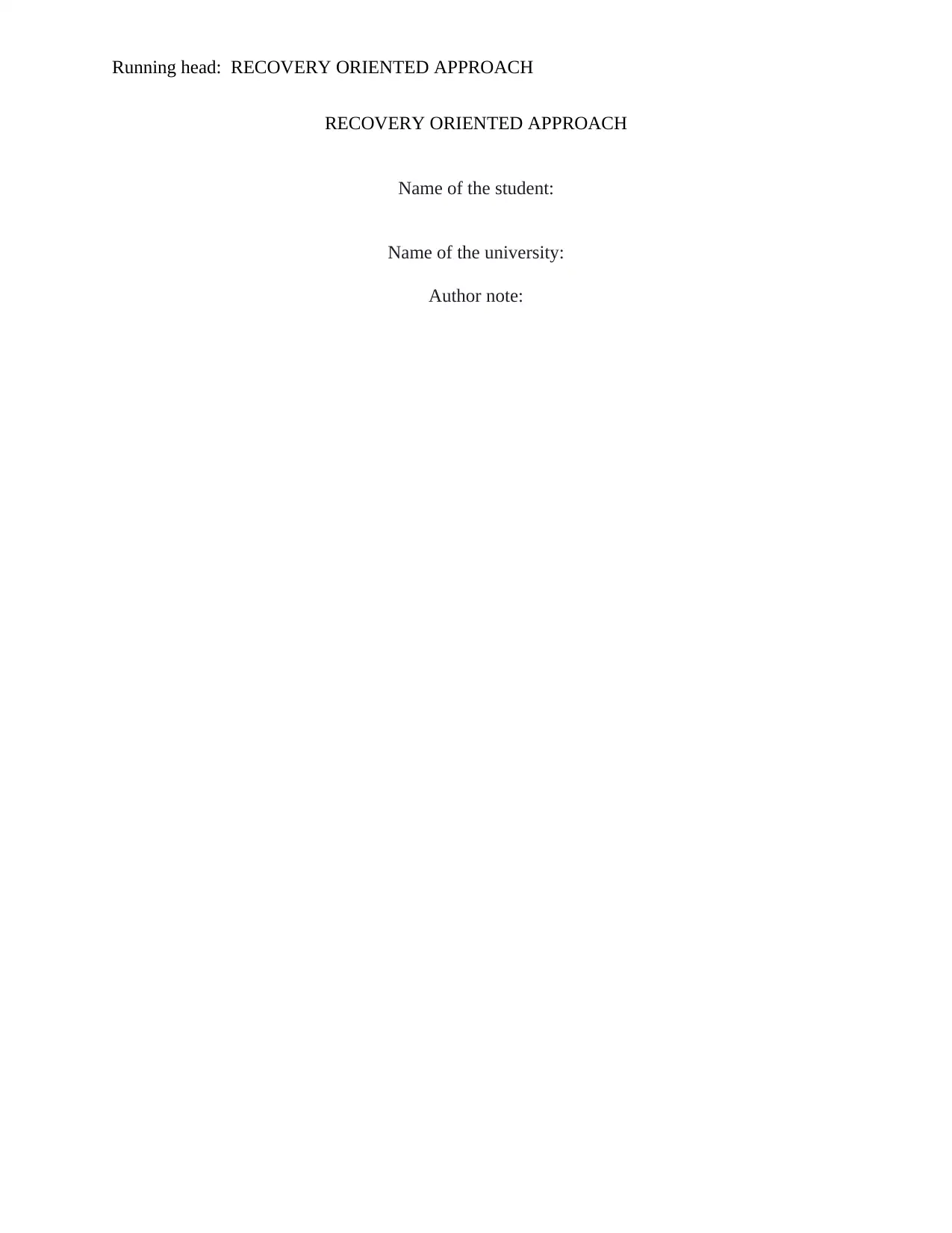
Running head: RECOVERY ORIENTED APPROACH
RECOVERY ORIENTED APPROACH
Name of the student:
Name of the university:
Author note:
RECOVERY ORIENTED APPROACH
Name of the student:
Name of the university:
Author note:
Paraphrase This Document
Need a fresh take? Get an instant paraphrase of this document with our AI Paraphraser
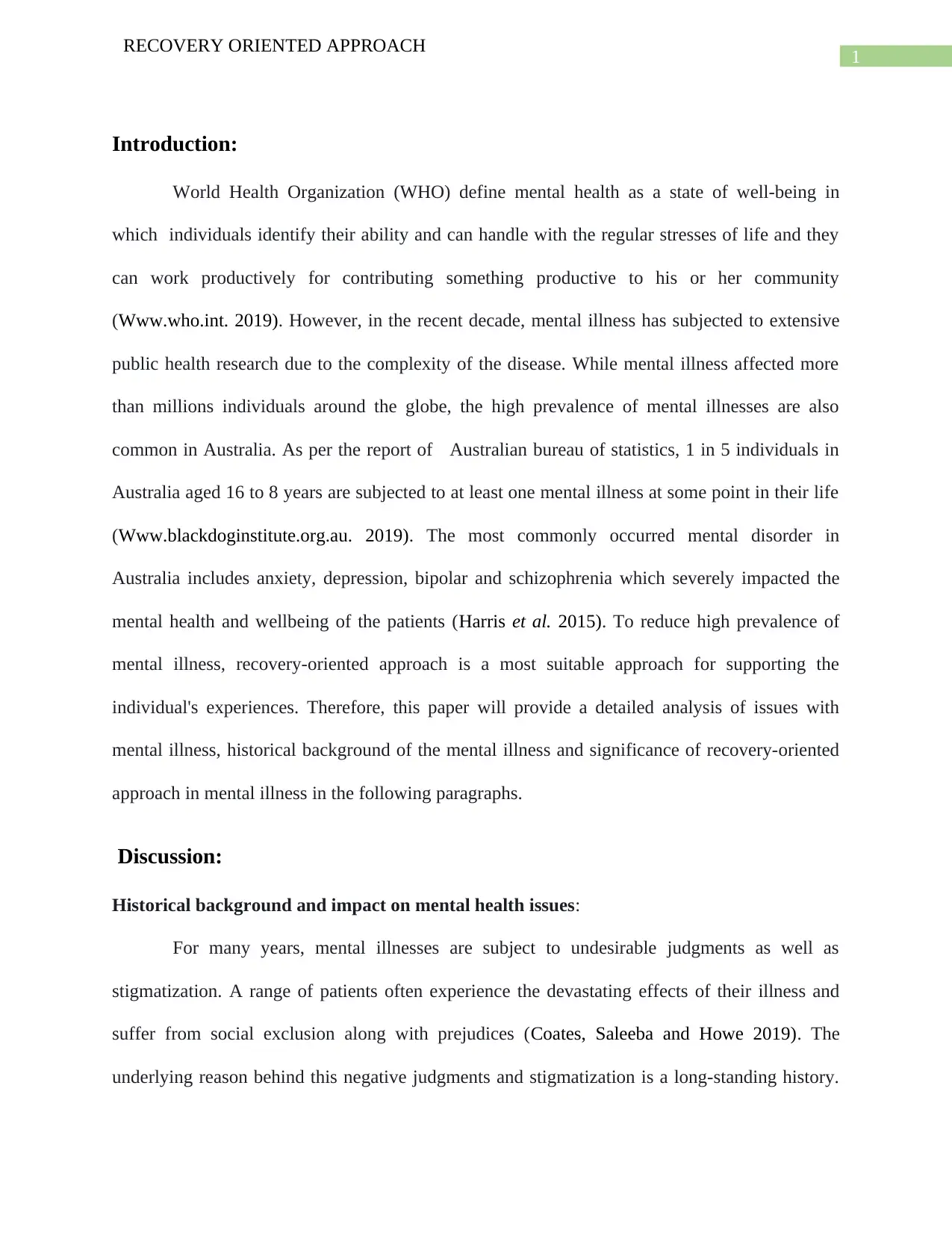
1
RECOVERY ORIENTED APPROACH
Introduction:
World Health Organization (WHO) define mental health as a state of well-being in
which individuals identify their ability and can handle with the regular stresses of life and they
can work productively for contributing something productive to his or her community
(Www.who.int. 2019). However, in the recent decade, mental illness has subjected to extensive
public health research due to the complexity of the disease. While mental illness affected more
than millions individuals around the globe, the high prevalence of mental illnesses are also
common in Australia. As per the report of Australian bureau of statistics, 1 in 5 individuals in
Australia aged 16 to 8 years are subjected to at least one mental illness at some point in their life
(Www.blackdoginstitute.org.au. 2019). The most commonly occurred mental disorder in
Australia includes anxiety, depression, bipolar and schizophrenia which severely impacted the
mental health and wellbeing of the patients (Harris et al. 2015). To reduce high prevalence of
mental illness, recovery-oriented approach is a most suitable approach for supporting the
individual's experiences. Therefore, this paper will provide a detailed analysis of issues with
mental illness, historical background of the mental illness and significance of recovery-oriented
approach in mental illness in the following paragraphs.
Discussion:
Historical background and impact on mental health issues:
For many years, mental illnesses are subject to undesirable judgments as well as
stigmatization. A range of patients often experience the devastating effects of their illness and
suffer from social exclusion along with prejudices (Coates, Saleeba and Howe 2019). The
underlying reason behind this negative judgments and stigmatization is a long-standing history.
RECOVERY ORIENTED APPROACH
Introduction:
World Health Organization (WHO) define mental health as a state of well-being in
which individuals identify their ability and can handle with the regular stresses of life and they
can work productively for contributing something productive to his or her community
(Www.who.int. 2019). However, in the recent decade, mental illness has subjected to extensive
public health research due to the complexity of the disease. While mental illness affected more
than millions individuals around the globe, the high prevalence of mental illnesses are also
common in Australia. As per the report of Australian bureau of statistics, 1 in 5 individuals in
Australia aged 16 to 8 years are subjected to at least one mental illness at some point in their life
(Www.blackdoginstitute.org.au. 2019). The most commonly occurred mental disorder in
Australia includes anxiety, depression, bipolar and schizophrenia which severely impacted the
mental health and wellbeing of the patients (Harris et al. 2015). To reduce high prevalence of
mental illness, recovery-oriented approach is a most suitable approach for supporting the
individual's experiences. Therefore, this paper will provide a detailed analysis of issues with
mental illness, historical background of the mental illness and significance of recovery-oriented
approach in mental illness in the following paragraphs.
Discussion:
Historical background and impact on mental health issues:
For many years, mental illnesses are subject to undesirable judgments as well as
stigmatization. A range of patients often experience the devastating effects of their illness and
suffer from social exclusion along with prejudices (Coates, Saleeba and Howe 2019). The
underlying reason behind this negative judgments and stigmatization is a long-standing history.
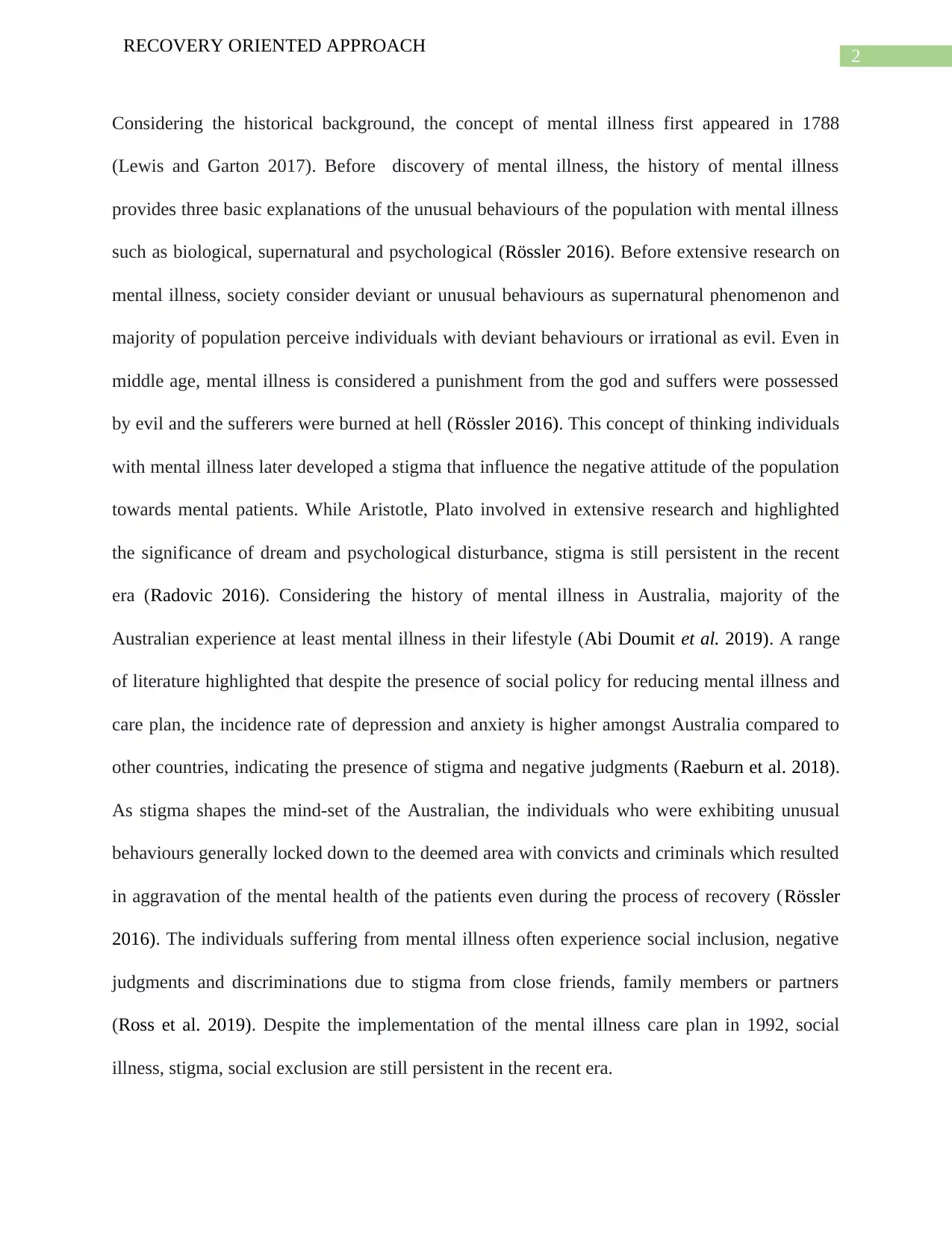
2
RECOVERY ORIENTED APPROACH
Considering the historical background, the concept of mental illness first appeared in 1788
(Lewis and Garton 2017). Before discovery of mental illness, the history of mental illness
provides three basic explanations of the unusual behaviours of the population with mental illness
such as biological, supernatural and psychological (Rössler 2016). Before extensive research on
mental illness, society consider deviant or unusual behaviours as supernatural phenomenon and
majority of population perceive individuals with deviant behaviours or irrational as evil. Even in
middle age, mental illness is considered a punishment from the god and suffers were possessed
by evil and the sufferers were burned at hell (Rössler 2016). This concept of thinking individuals
with mental illness later developed a stigma that influence the negative attitude of the population
towards mental patients. While Aristotle, Plato involved in extensive research and highlighted
the significance of dream and psychological disturbance, stigma is still persistent in the recent
era (Radovic 2016). Considering the history of mental illness in Australia, majority of the
Australian experience at least mental illness in their lifestyle (Abi Doumit et al. 2019). A range
of literature highlighted that despite the presence of social policy for reducing mental illness and
care plan, the incidence rate of depression and anxiety is higher amongst Australia compared to
other countries, indicating the presence of stigma and negative judgments (Raeburn et al. 2018).
As stigma shapes the mind-set of the Australian, the individuals who were exhibiting unusual
behaviours generally locked down to the deemed area with convicts and criminals which resulted
in aggravation of the mental health of the patients even during the process of recovery (Rössler
2016). The individuals suffering from mental illness often experience social inclusion, negative
judgments and discriminations due to stigma from close friends, family members or partners
(Ross et al. 2019). Despite the implementation of the mental illness care plan in 1992, social
illness, stigma, social exclusion are still persistent in the recent era.
RECOVERY ORIENTED APPROACH
Considering the historical background, the concept of mental illness first appeared in 1788
(Lewis and Garton 2017). Before discovery of mental illness, the history of mental illness
provides three basic explanations of the unusual behaviours of the population with mental illness
such as biological, supernatural and psychological (Rössler 2016). Before extensive research on
mental illness, society consider deviant or unusual behaviours as supernatural phenomenon and
majority of population perceive individuals with deviant behaviours or irrational as evil. Even in
middle age, mental illness is considered a punishment from the god and suffers were possessed
by evil and the sufferers were burned at hell (Rössler 2016). This concept of thinking individuals
with mental illness later developed a stigma that influence the negative attitude of the population
towards mental patients. While Aristotle, Plato involved in extensive research and highlighted
the significance of dream and psychological disturbance, stigma is still persistent in the recent
era (Radovic 2016). Considering the history of mental illness in Australia, majority of the
Australian experience at least mental illness in their lifestyle (Abi Doumit et al. 2019). A range
of literature highlighted that despite the presence of social policy for reducing mental illness and
care plan, the incidence rate of depression and anxiety is higher amongst Australia compared to
other countries, indicating the presence of stigma and negative judgments (Raeburn et al. 2018).
As stigma shapes the mind-set of the Australian, the individuals who were exhibiting unusual
behaviours generally locked down to the deemed area with convicts and criminals which resulted
in aggravation of the mental health of the patients even during the process of recovery (Rössler
2016). The individuals suffering from mental illness often experience social inclusion, negative
judgments and discriminations due to stigma from close friends, family members or partners
(Ross et al. 2019). Despite the implementation of the mental illness care plan in 1992, social
illness, stigma, social exclusion are still persistent in the recent era.
⊘ This is a preview!⊘
Do you want full access?
Subscribe today to unlock all pages.

Trusted by 1+ million students worldwide
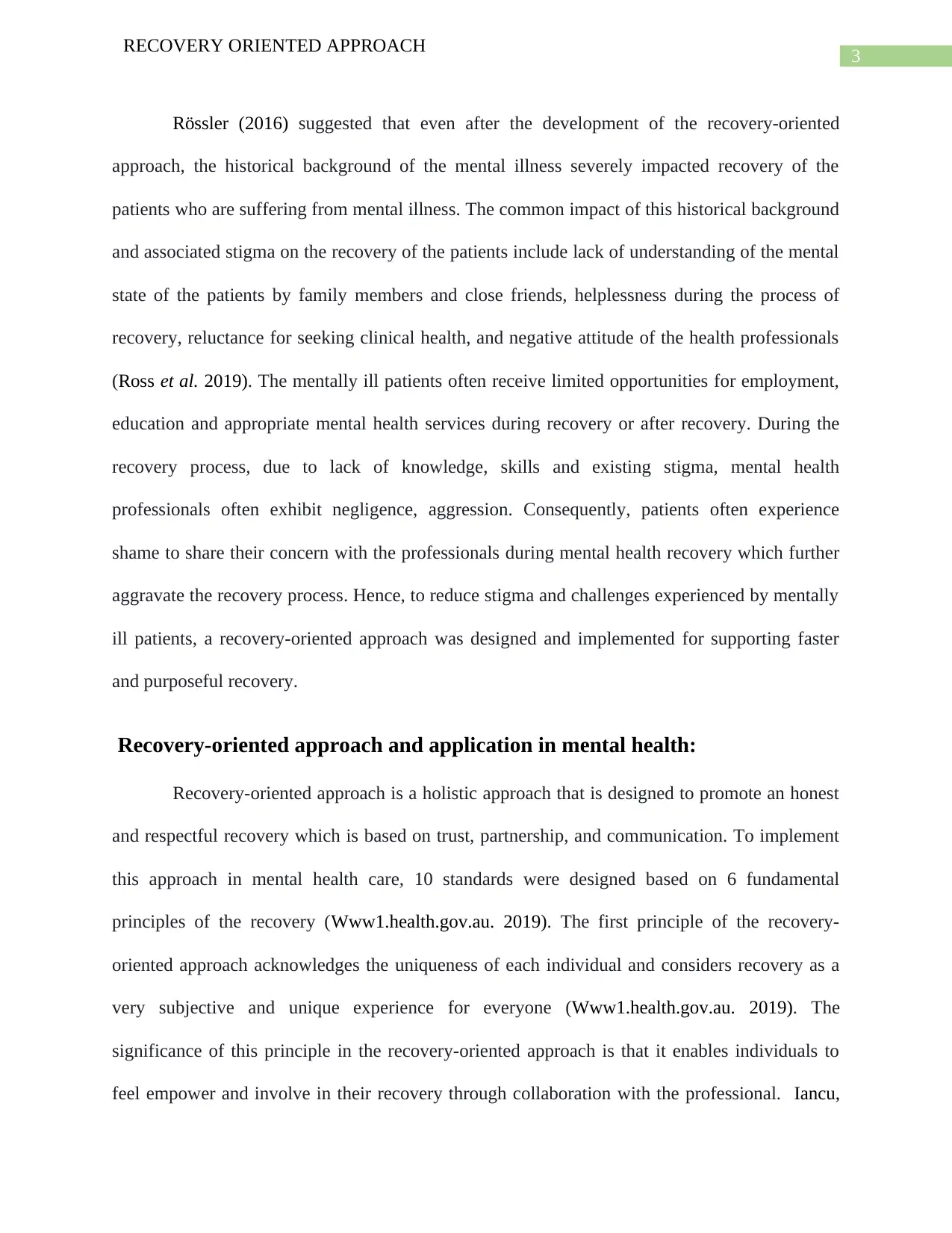
3
RECOVERY ORIENTED APPROACH
Rössler (2016) suggested that even after the development of the recovery-oriented
approach, the historical background of the mental illness severely impacted recovery of the
patients who are suffering from mental illness. The common impact of this historical background
and associated stigma on the recovery of the patients include lack of understanding of the mental
state of the patients by family members and close friends, helplessness during the process of
recovery, reluctance for seeking clinical health, and negative attitude of the health professionals
(Ross et al. 2019). The mentally ill patients often receive limited opportunities for employment,
education and appropriate mental health services during recovery or after recovery. During the
recovery process, due to lack of knowledge, skills and existing stigma, mental health
professionals often exhibit negligence, aggression. Consequently, patients often experience
shame to share their concern with the professionals during mental health recovery which further
aggravate the recovery process. Hence, to reduce stigma and challenges experienced by mentally
ill patients, a recovery-oriented approach was designed and implemented for supporting faster
and purposeful recovery.
Recovery-oriented approach and application in mental health:
Recovery-oriented approach is a holistic approach that is designed to promote an honest
and respectful recovery which is based on trust, partnership, and communication. To implement
this approach in mental health care, 10 standards were designed based on 6 fundamental
principles of the recovery (Www1.health.gov.au. 2019). The first principle of the recovery-
oriented approach acknowledges the uniqueness of each individual and considers recovery as a
very subjective and unique experience for everyone (Www1.health.gov.au. 2019). The
significance of this principle in the recovery-oriented approach is that it enables individuals to
feel empower and involve in their recovery through collaboration with the professional. Iancu,
RECOVERY ORIENTED APPROACH
Rössler (2016) suggested that even after the development of the recovery-oriented
approach, the historical background of the mental illness severely impacted recovery of the
patients who are suffering from mental illness. The common impact of this historical background
and associated stigma on the recovery of the patients include lack of understanding of the mental
state of the patients by family members and close friends, helplessness during the process of
recovery, reluctance for seeking clinical health, and negative attitude of the health professionals
(Ross et al. 2019). The mentally ill patients often receive limited opportunities for employment,
education and appropriate mental health services during recovery or after recovery. During the
recovery process, due to lack of knowledge, skills and existing stigma, mental health
professionals often exhibit negligence, aggression. Consequently, patients often experience
shame to share their concern with the professionals during mental health recovery which further
aggravate the recovery process. Hence, to reduce stigma and challenges experienced by mentally
ill patients, a recovery-oriented approach was designed and implemented for supporting faster
and purposeful recovery.
Recovery-oriented approach and application in mental health:
Recovery-oriented approach is a holistic approach that is designed to promote an honest
and respectful recovery which is based on trust, partnership, and communication. To implement
this approach in mental health care, 10 standards were designed based on 6 fundamental
principles of the recovery (Www1.health.gov.au. 2019). The first principle of the recovery-
oriented approach acknowledges the uniqueness of each individual and considers recovery as a
very subjective and unique experience for everyone (Www1.health.gov.au. 2019). The
significance of this principle in the recovery-oriented approach is that it enables individuals to
feel empower and involve in their recovery through collaboration with the professional. Iancu,
Paraphrase This Document
Need a fresh take? Get an instant paraphrase of this document with our AI Paraphraser
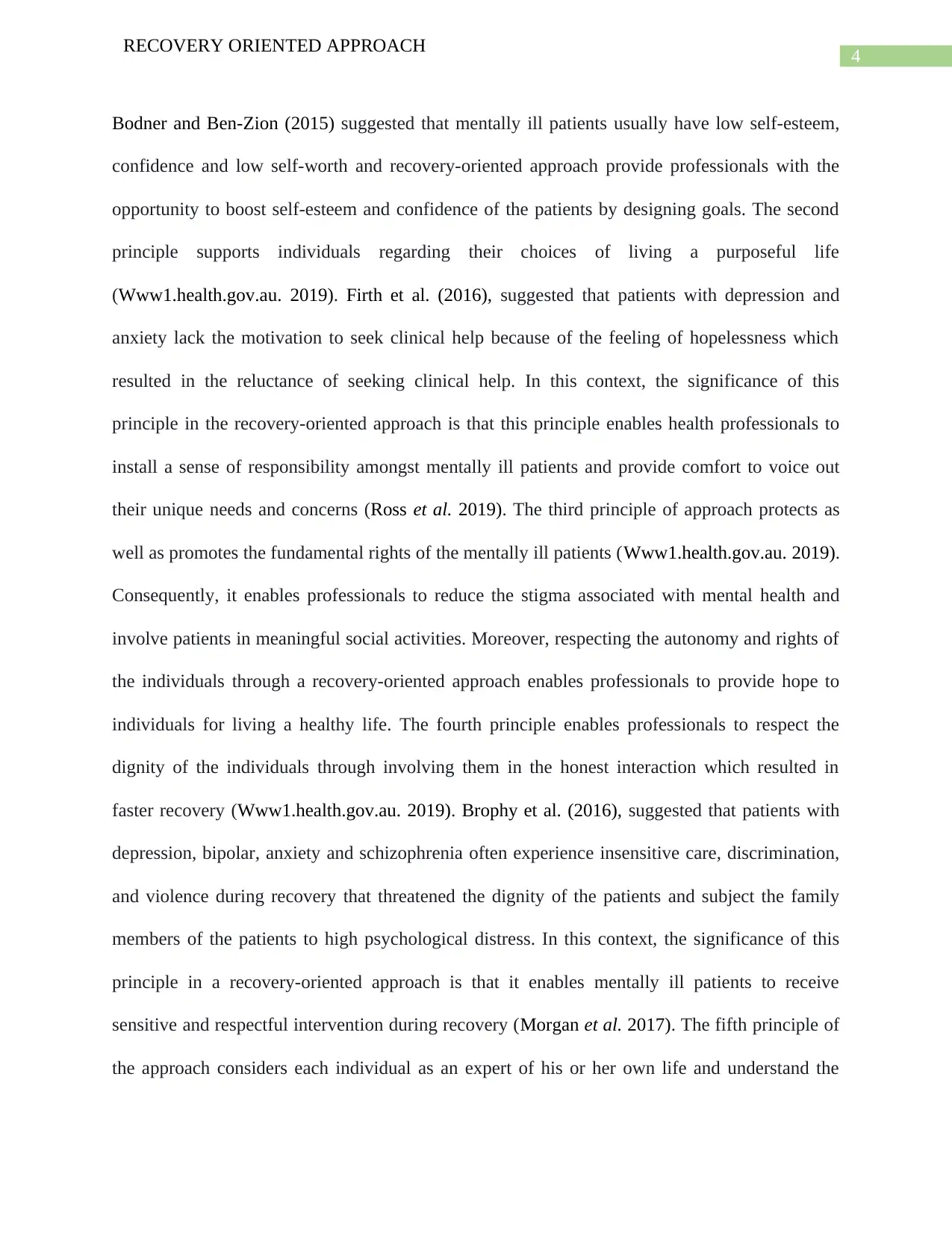
4
RECOVERY ORIENTED APPROACH
Bodner and Ben-Zion (2015) suggested that mentally ill patients usually have low self-esteem,
confidence and low self-worth and recovery-oriented approach provide professionals with the
opportunity to boost self-esteem and confidence of the patients by designing goals. The second
principle supports individuals regarding their choices of living a purposeful life
(Www1.health.gov.au. 2019). Firth et al. (2016), suggested that patients with depression and
anxiety lack the motivation to seek clinical help because of the feeling of hopelessness which
resulted in the reluctance of seeking clinical help. In this context, the significance of this
principle in the recovery-oriented approach is that this principle enables health professionals to
install a sense of responsibility amongst mentally ill patients and provide comfort to voice out
their unique needs and concerns (Ross et al. 2019). The third principle of approach protects as
well as promotes the fundamental rights of the mentally ill patients (Www1.health.gov.au. 2019).
Consequently, it enables professionals to reduce the stigma associated with mental health and
involve patients in meaningful social activities. Moreover, respecting the autonomy and rights of
the individuals through a recovery-oriented approach enables professionals to provide hope to
individuals for living a healthy life. The fourth principle enables professionals to respect the
dignity of the individuals through involving them in the honest interaction which resulted in
faster recovery (Www1.health.gov.au. 2019). Brophy et al. (2016), suggested that patients with
depression, bipolar, anxiety and schizophrenia often experience insensitive care, discrimination,
and violence during recovery that threatened the dignity of the patients and subject the family
members of the patients to high psychological distress. In this context, the significance of this
principle in a recovery-oriented approach is that it enables mentally ill patients to receive
sensitive and respectful intervention during recovery (Morgan et al. 2017). The fifth principle of
the approach considers each individual as an expert of his or her own life and understand the
RECOVERY ORIENTED APPROACH
Bodner and Ben-Zion (2015) suggested that mentally ill patients usually have low self-esteem,
confidence and low self-worth and recovery-oriented approach provide professionals with the
opportunity to boost self-esteem and confidence of the patients by designing goals. The second
principle supports individuals regarding their choices of living a purposeful life
(Www1.health.gov.au. 2019). Firth et al. (2016), suggested that patients with depression and
anxiety lack the motivation to seek clinical help because of the feeling of hopelessness which
resulted in the reluctance of seeking clinical help. In this context, the significance of this
principle in the recovery-oriented approach is that this principle enables health professionals to
install a sense of responsibility amongst mentally ill patients and provide comfort to voice out
their unique needs and concerns (Ross et al. 2019). The third principle of approach protects as
well as promotes the fundamental rights of the mentally ill patients (Www1.health.gov.au. 2019).
Consequently, it enables professionals to reduce the stigma associated with mental health and
involve patients in meaningful social activities. Moreover, respecting the autonomy and rights of
the individuals through a recovery-oriented approach enables professionals to provide hope to
individuals for living a healthy life. The fourth principle enables professionals to respect the
dignity of the individuals through involving them in the honest interaction which resulted in
faster recovery (Www1.health.gov.au. 2019). Brophy et al. (2016), suggested that patients with
depression, bipolar, anxiety and schizophrenia often experience insensitive care, discrimination,
and violence during recovery that threatened the dignity of the patients and subject the family
members of the patients to high psychological distress. In this context, the significance of this
principle in a recovery-oriented approach is that it enables mentally ill patients to receive
sensitive and respectful intervention during recovery (Morgan et al. 2017). The fifth principle of
the approach considers each individual as an expert of his or her own life and understand the
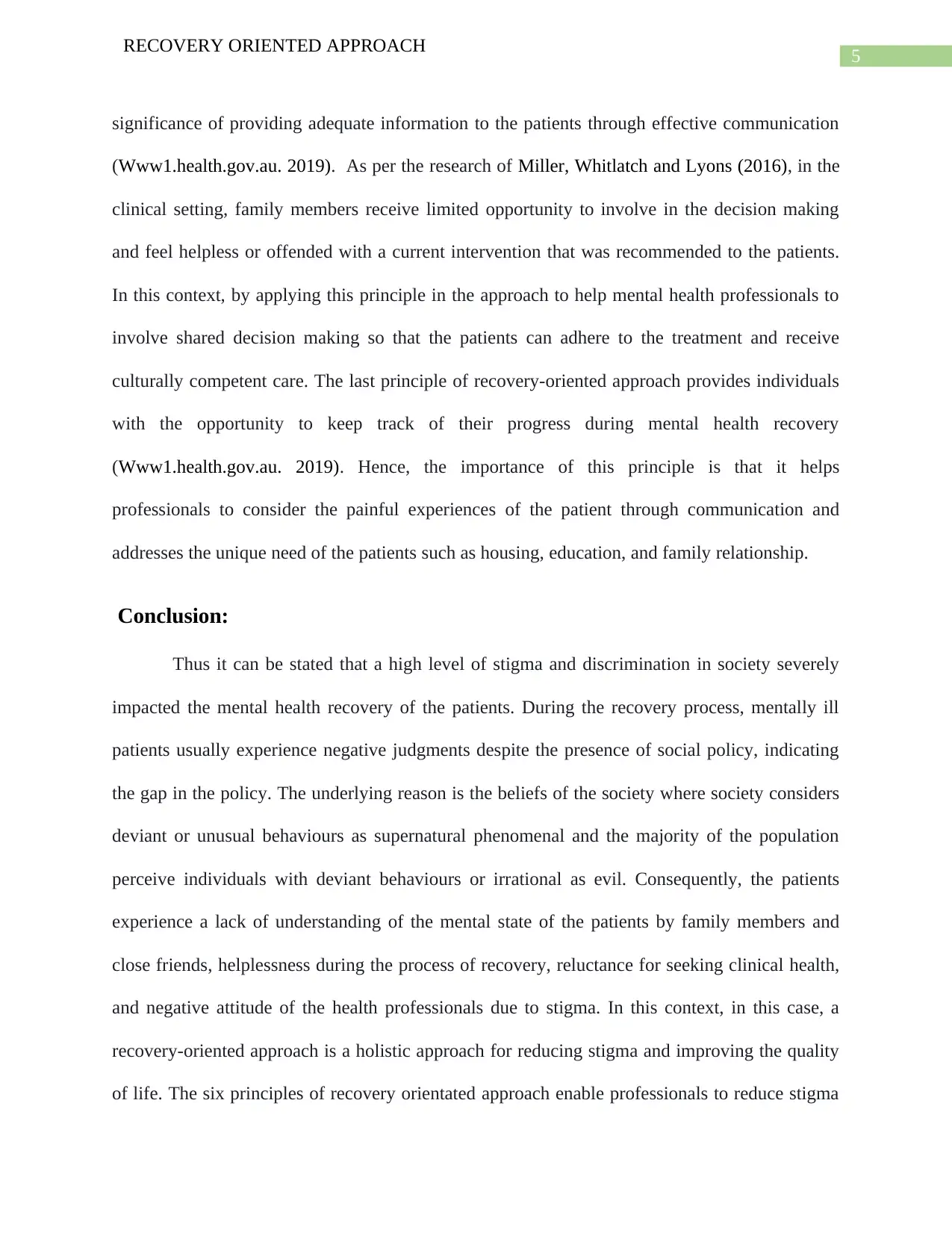
5
RECOVERY ORIENTED APPROACH
significance of providing adequate information to the patients through effective communication
(Www1.health.gov.au. 2019). As per the research of Miller, Whitlatch and Lyons (2016), in the
clinical setting, family members receive limited opportunity to involve in the decision making
and feel helpless or offended with a current intervention that was recommended to the patients.
In this context, by applying this principle in the approach to help mental health professionals to
involve shared decision making so that the patients can adhere to the treatment and receive
culturally competent care. The last principle of recovery-oriented approach provides individuals
with the opportunity to keep track of their progress during mental health recovery
(Www1.health.gov.au. 2019). Hence, the importance of this principle is that it helps
professionals to consider the painful experiences of the patient through communication and
addresses the unique need of the patients such as housing, education, and family relationship.
Conclusion:
Thus it can be stated that a high level of stigma and discrimination in society severely
impacted the mental health recovery of the patients. During the recovery process, mentally ill
patients usually experience negative judgments despite the presence of social policy, indicating
the gap in the policy. The underlying reason is the beliefs of the society where society considers
deviant or unusual behaviours as supernatural phenomenal and the majority of the population
perceive individuals with deviant behaviours or irrational as evil. Consequently, the patients
experience a lack of understanding of the mental state of the patients by family members and
close friends, helplessness during the process of recovery, reluctance for seeking clinical health,
and negative attitude of the health professionals due to stigma. In this context, in this case, a
recovery-oriented approach is a holistic approach for reducing stigma and improving the quality
of life. The six principles of recovery orientated approach enable professionals to reduce stigma
RECOVERY ORIENTED APPROACH
significance of providing adequate information to the patients through effective communication
(Www1.health.gov.au. 2019). As per the research of Miller, Whitlatch and Lyons (2016), in the
clinical setting, family members receive limited opportunity to involve in the decision making
and feel helpless or offended with a current intervention that was recommended to the patients.
In this context, by applying this principle in the approach to help mental health professionals to
involve shared decision making so that the patients can adhere to the treatment and receive
culturally competent care. The last principle of recovery-oriented approach provides individuals
with the opportunity to keep track of their progress during mental health recovery
(Www1.health.gov.au. 2019). Hence, the importance of this principle is that it helps
professionals to consider the painful experiences of the patient through communication and
addresses the unique need of the patients such as housing, education, and family relationship.
Conclusion:
Thus it can be stated that a high level of stigma and discrimination in society severely
impacted the mental health recovery of the patients. During the recovery process, mentally ill
patients usually experience negative judgments despite the presence of social policy, indicating
the gap in the policy. The underlying reason is the beliefs of the society where society considers
deviant or unusual behaviours as supernatural phenomenal and the majority of the population
perceive individuals with deviant behaviours or irrational as evil. Consequently, the patients
experience a lack of understanding of the mental state of the patients by family members and
close friends, helplessness during the process of recovery, reluctance for seeking clinical health,
and negative attitude of the health professionals due to stigma. In this context, in this case, a
recovery-oriented approach is a holistic approach for reducing stigma and improving the quality
of life. The six principles of recovery orientated approach enable professionals to reduce stigma
⊘ This is a preview!⊘
Do you want full access?
Subscribe today to unlock all pages.

Trusted by 1+ million students worldwide
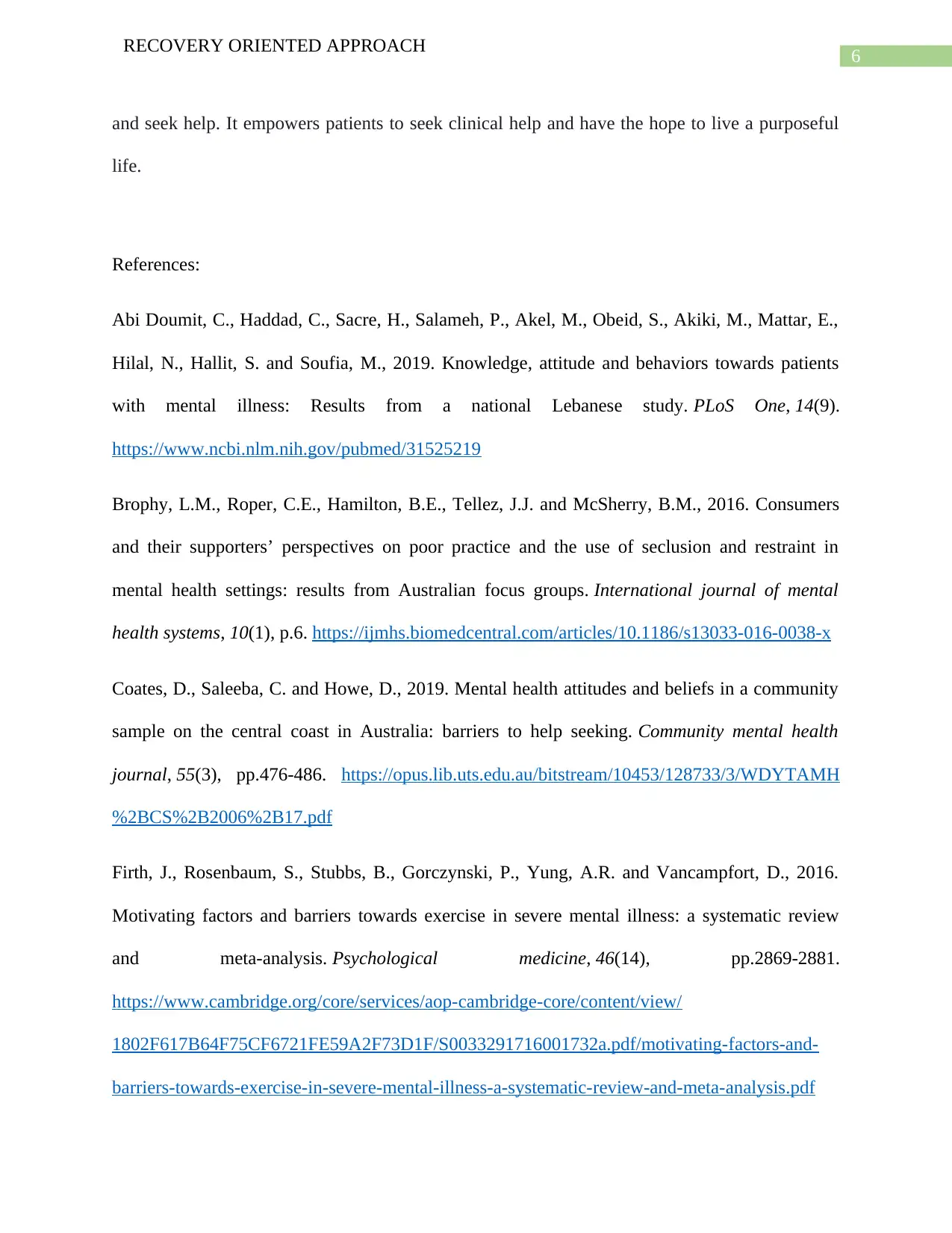
6
RECOVERY ORIENTED APPROACH
and seek help. It empowers patients to seek clinical help and have the hope to live a purposeful
life.
References:
Abi Doumit, C., Haddad, C., Sacre, H., Salameh, P., Akel, M., Obeid, S., Akiki, M., Mattar, E.,
Hilal, N., Hallit, S. and Soufia, M., 2019. Knowledge, attitude and behaviors towards patients
with mental illness: Results from a national Lebanese study. PLoS One, 14(9).
https://www.ncbi.nlm.nih.gov/pubmed/31525219
Brophy, L.M., Roper, C.E., Hamilton, B.E., Tellez, J.J. and McSherry, B.M., 2016. Consumers
and their supporters’ perspectives on poor practice and the use of seclusion and restraint in
mental health settings: results from Australian focus groups. International journal of mental
health systems, 10(1), p.6. https://ijmhs.biomedcentral.com/articles/10.1186/s13033-016-0038-x
Coates, D., Saleeba, C. and Howe, D., 2019. Mental health attitudes and beliefs in a community
sample on the central coast in Australia: barriers to help seeking. Community mental health
journal, 55(3), pp.476-486. https://opus.lib.uts.edu.au/bitstream/10453/128733/3/WDYTAMH
%2BCS%2B2006%2B17.pdf
Firth, J., Rosenbaum, S., Stubbs, B., Gorczynski, P., Yung, A.R. and Vancampfort, D., 2016.
Motivating factors and barriers towards exercise in severe mental illness: a systematic review
and meta-analysis. Psychological medicine, 46(14), pp.2869-2881.
https://www.cambridge.org/core/services/aop-cambridge-core/content/view/
1802F617B64F75CF6721FE59A2F73D1F/S0033291716001732a.pdf/motivating-factors-and-
barriers-towards-exercise-in-severe-mental-illness-a-systematic-review-and-meta-analysis.pdf
RECOVERY ORIENTED APPROACH
and seek help. It empowers patients to seek clinical help and have the hope to live a purposeful
life.
References:
Abi Doumit, C., Haddad, C., Sacre, H., Salameh, P., Akel, M., Obeid, S., Akiki, M., Mattar, E.,
Hilal, N., Hallit, S. and Soufia, M., 2019. Knowledge, attitude and behaviors towards patients
with mental illness: Results from a national Lebanese study. PLoS One, 14(9).
https://www.ncbi.nlm.nih.gov/pubmed/31525219
Brophy, L.M., Roper, C.E., Hamilton, B.E., Tellez, J.J. and McSherry, B.M., 2016. Consumers
and their supporters’ perspectives on poor practice and the use of seclusion and restraint in
mental health settings: results from Australian focus groups. International journal of mental
health systems, 10(1), p.6. https://ijmhs.biomedcentral.com/articles/10.1186/s13033-016-0038-x
Coates, D., Saleeba, C. and Howe, D., 2019. Mental health attitudes and beliefs in a community
sample on the central coast in Australia: barriers to help seeking. Community mental health
journal, 55(3), pp.476-486. https://opus.lib.uts.edu.au/bitstream/10453/128733/3/WDYTAMH
%2BCS%2B2006%2B17.pdf
Firth, J., Rosenbaum, S., Stubbs, B., Gorczynski, P., Yung, A.R. and Vancampfort, D., 2016.
Motivating factors and barriers towards exercise in severe mental illness: a systematic review
and meta-analysis. Psychological medicine, 46(14), pp.2869-2881.
https://www.cambridge.org/core/services/aop-cambridge-core/content/view/
1802F617B64F75CF6721FE59A2F73D1F/S0033291716001732a.pdf/motivating-factors-and-
barriers-towards-exercise-in-severe-mental-illness-a-systematic-review-and-meta-analysis.pdf
Paraphrase This Document
Need a fresh take? Get an instant paraphrase of this document with our AI Paraphraser
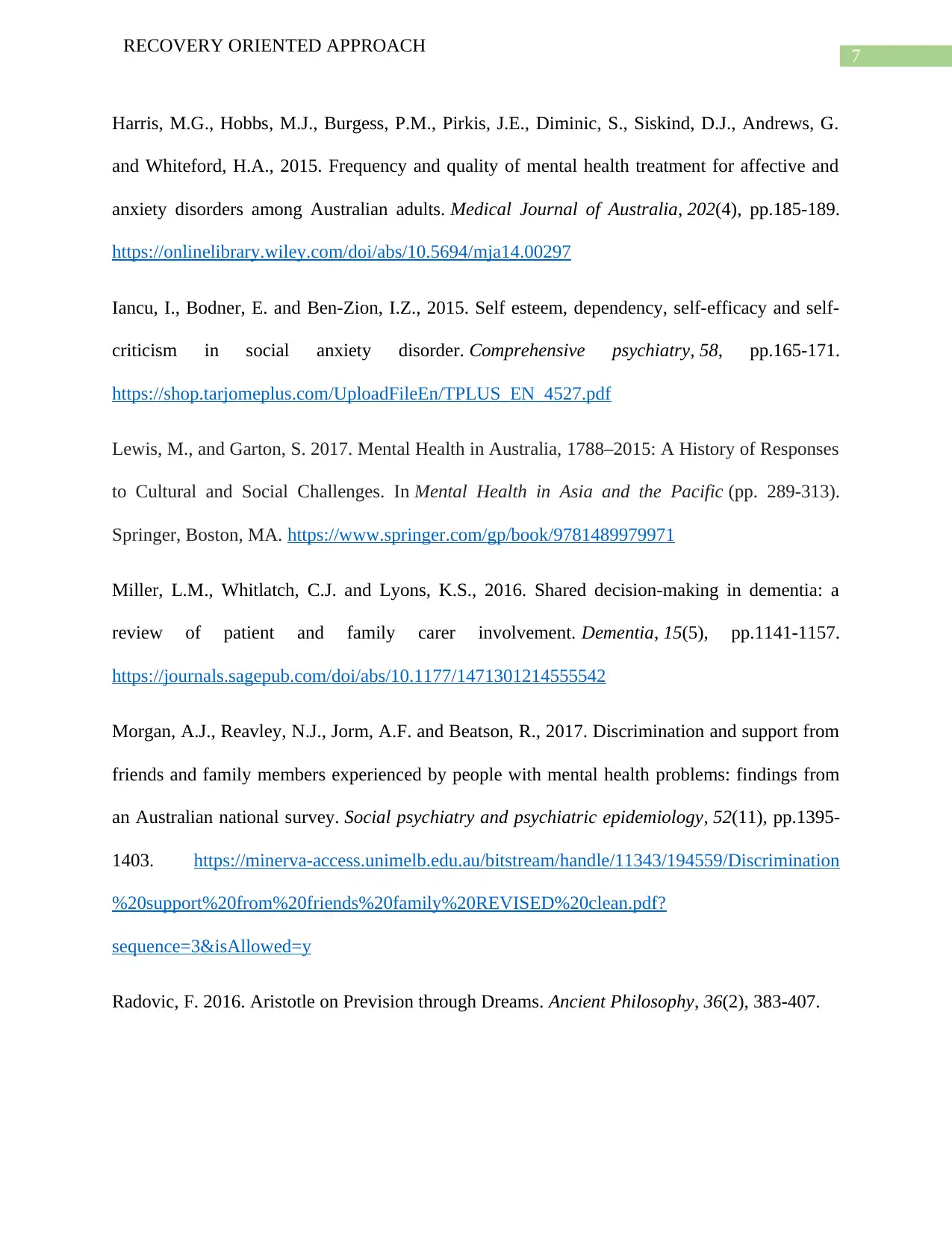
7
RECOVERY ORIENTED APPROACH
Harris, M.G., Hobbs, M.J., Burgess, P.M., Pirkis, J.E., Diminic, S., Siskind, D.J., Andrews, G.
and Whiteford, H.A., 2015. Frequency and quality of mental health treatment for affective and
anxiety disorders among Australian adults. Medical Journal of Australia, 202(4), pp.185-189.
https://onlinelibrary.wiley.com/doi/abs/10.5694/mja14.00297
Iancu, I., Bodner, E. and Ben-Zion, I.Z., 2015. Self esteem, dependency, self-efficacy and self-
criticism in social anxiety disorder. Comprehensive psychiatry, 58, pp.165-171.
https://shop.tarjomeplus.com/UploadFileEn/TPLUS_EN_4527.pdf
Lewis, M., and Garton, S. 2017. Mental Health in Australia, 1788–2015: A History of Responses
to Cultural and Social Challenges. In Mental Health in Asia and the Pacific (pp. 289-313).
Springer, Boston, MA. https://www.springer.com/gp/book/9781489979971
Miller, L.M., Whitlatch, C.J. and Lyons, K.S., 2016. Shared decision-making in dementia: a
review of patient and family carer involvement. Dementia, 15(5), pp.1141-1157.
https://journals.sagepub.com/doi/abs/10.1177/1471301214555542
Morgan, A.J., Reavley, N.J., Jorm, A.F. and Beatson, R., 2017. Discrimination and support from
friends and family members experienced by people with mental health problems: findings from
an Australian national survey. Social psychiatry and psychiatric epidemiology, 52(11), pp.1395-
1403. https://minerva-access.unimelb.edu.au/bitstream/handle/11343/194559/Discrimination
%20support%20from%20friends%20family%20REVISED%20clean.pdf?
sequence=3&isAllowed=y
Radovic, F. 2016. Aristotle on Prevision through Dreams. Ancient Philosophy, 36(2), 383-407.
RECOVERY ORIENTED APPROACH
Harris, M.G., Hobbs, M.J., Burgess, P.M., Pirkis, J.E., Diminic, S., Siskind, D.J., Andrews, G.
and Whiteford, H.A., 2015. Frequency and quality of mental health treatment for affective and
anxiety disorders among Australian adults. Medical Journal of Australia, 202(4), pp.185-189.
https://onlinelibrary.wiley.com/doi/abs/10.5694/mja14.00297
Iancu, I., Bodner, E. and Ben-Zion, I.Z., 2015. Self esteem, dependency, self-efficacy and self-
criticism in social anxiety disorder. Comprehensive psychiatry, 58, pp.165-171.
https://shop.tarjomeplus.com/UploadFileEn/TPLUS_EN_4527.pdf
Lewis, M., and Garton, S. 2017. Mental Health in Australia, 1788–2015: A History of Responses
to Cultural and Social Challenges. In Mental Health in Asia and the Pacific (pp. 289-313).
Springer, Boston, MA. https://www.springer.com/gp/book/9781489979971
Miller, L.M., Whitlatch, C.J. and Lyons, K.S., 2016. Shared decision-making in dementia: a
review of patient and family carer involvement. Dementia, 15(5), pp.1141-1157.
https://journals.sagepub.com/doi/abs/10.1177/1471301214555542
Morgan, A.J., Reavley, N.J., Jorm, A.F. and Beatson, R., 2017. Discrimination and support from
friends and family members experienced by people with mental health problems: findings from
an Australian national survey. Social psychiatry and psychiatric epidemiology, 52(11), pp.1395-
1403. https://minerva-access.unimelb.edu.au/bitstream/handle/11343/194559/Discrimination
%20support%20from%20friends%20family%20REVISED%20clean.pdf?
sequence=3&isAllowed=y
Radovic, F. 2016. Aristotle on Prevision through Dreams. Ancient Philosophy, 36(2), 383-407.
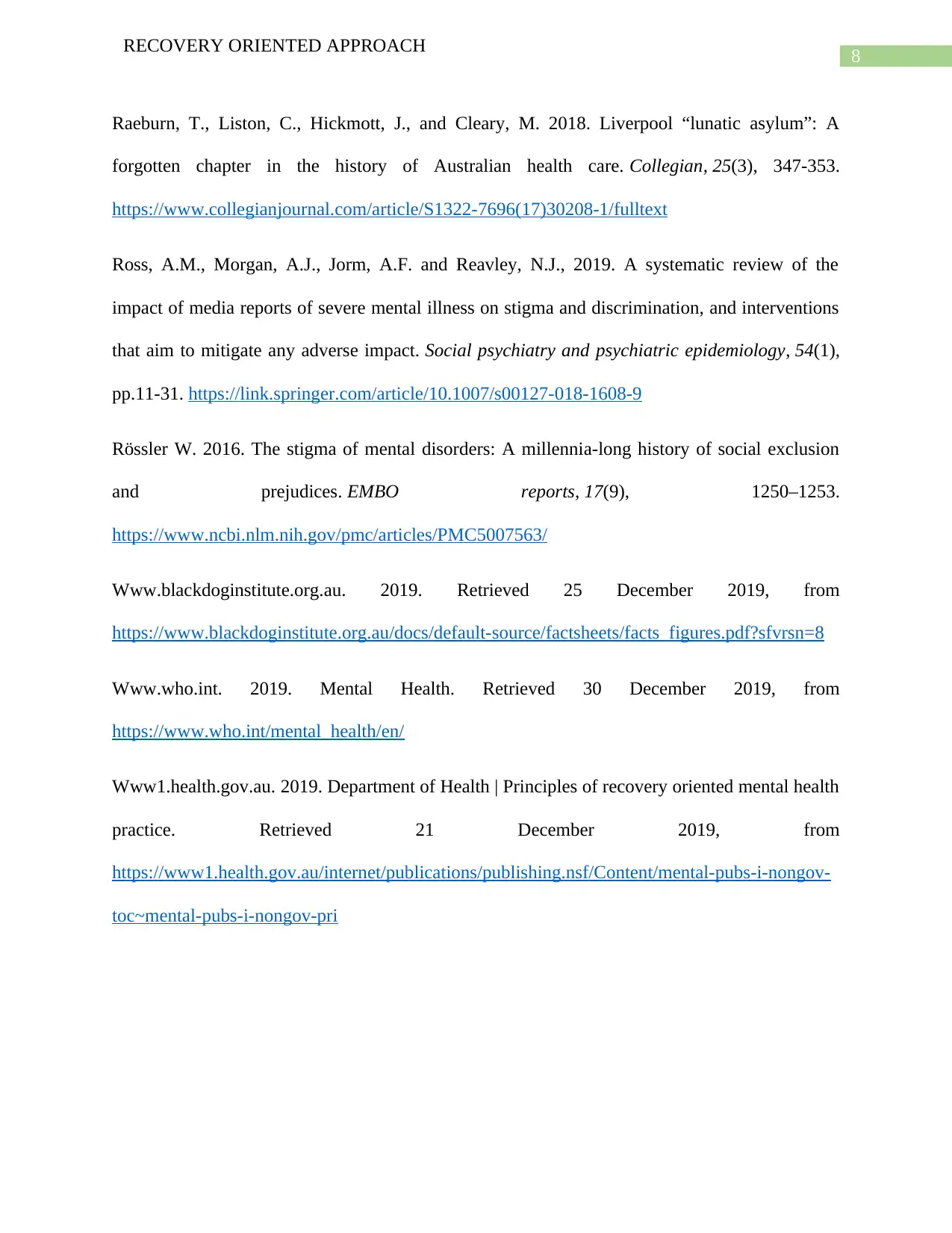
8
RECOVERY ORIENTED APPROACH
Raeburn, T., Liston, C., Hickmott, J., and Cleary, M. 2018. Liverpool “lunatic asylum”: A
forgotten chapter in the history of Australian health care. Collegian, 25(3), 347-353.
https://www.collegianjournal.com/article/S1322-7696(17)30208-1/fulltext
Ross, A.M., Morgan, A.J., Jorm, A.F. and Reavley, N.J., 2019. A systematic review of the
impact of media reports of severe mental illness on stigma and discrimination, and interventions
that aim to mitigate any adverse impact. Social psychiatry and psychiatric epidemiology, 54(1),
pp.11-31. https://link.springer.com/article/10.1007/s00127-018-1608-9
Rössler W. 2016. The stigma of mental disorders: A millennia-long history of social exclusion
and prejudices. EMBO reports, 17(9), 1250–1253.
https://www.ncbi.nlm.nih.gov/pmc/articles/PMC5007563/
Www.blackdoginstitute.org.au. 2019. Retrieved 25 December 2019, from
https://www.blackdoginstitute.org.au/docs/default-source/factsheets/facts_figures.pdf?sfvrsn=8
Www.who.int. 2019. Mental Health. Retrieved 30 December 2019, from
https://www.who.int/mental_health/en/
Www1.health.gov.au. 2019. Department of Health | Principles of recovery oriented mental health
practice. Retrieved 21 December 2019, from
https://www1.health.gov.au/internet/publications/publishing.nsf/Content/mental-pubs-i-nongov-
toc~mental-pubs-i-nongov-pri
RECOVERY ORIENTED APPROACH
Raeburn, T., Liston, C., Hickmott, J., and Cleary, M. 2018. Liverpool “lunatic asylum”: A
forgotten chapter in the history of Australian health care. Collegian, 25(3), 347-353.
https://www.collegianjournal.com/article/S1322-7696(17)30208-1/fulltext
Ross, A.M., Morgan, A.J., Jorm, A.F. and Reavley, N.J., 2019. A systematic review of the
impact of media reports of severe mental illness on stigma and discrimination, and interventions
that aim to mitigate any adverse impact. Social psychiatry and psychiatric epidemiology, 54(1),
pp.11-31. https://link.springer.com/article/10.1007/s00127-018-1608-9
Rössler W. 2016. The stigma of mental disorders: A millennia-long history of social exclusion
and prejudices. EMBO reports, 17(9), 1250–1253.
https://www.ncbi.nlm.nih.gov/pmc/articles/PMC5007563/
Www.blackdoginstitute.org.au. 2019. Retrieved 25 December 2019, from
https://www.blackdoginstitute.org.au/docs/default-source/factsheets/facts_figures.pdf?sfvrsn=8
Www.who.int. 2019. Mental Health. Retrieved 30 December 2019, from
https://www.who.int/mental_health/en/
Www1.health.gov.au. 2019. Department of Health | Principles of recovery oriented mental health
practice. Retrieved 21 December 2019, from
https://www1.health.gov.au/internet/publications/publishing.nsf/Content/mental-pubs-i-nongov-
toc~mental-pubs-i-nongov-pri
⊘ This is a preview!⊘
Do you want full access?
Subscribe today to unlock all pages.

Trusted by 1+ million students worldwide
1 out of 9
Related Documents
Your All-in-One AI-Powered Toolkit for Academic Success.
+13062052269
info@desklib.com
Available 24*7 on WhatsApp / Email
![[object Object]](/_next/static/media/star-bottom.7253800d.svg)
Unlock your academic potential
Copyright © 2020–2026 A2Z Services. All Rights Reserved. Developed and managed by ZUCOL.





